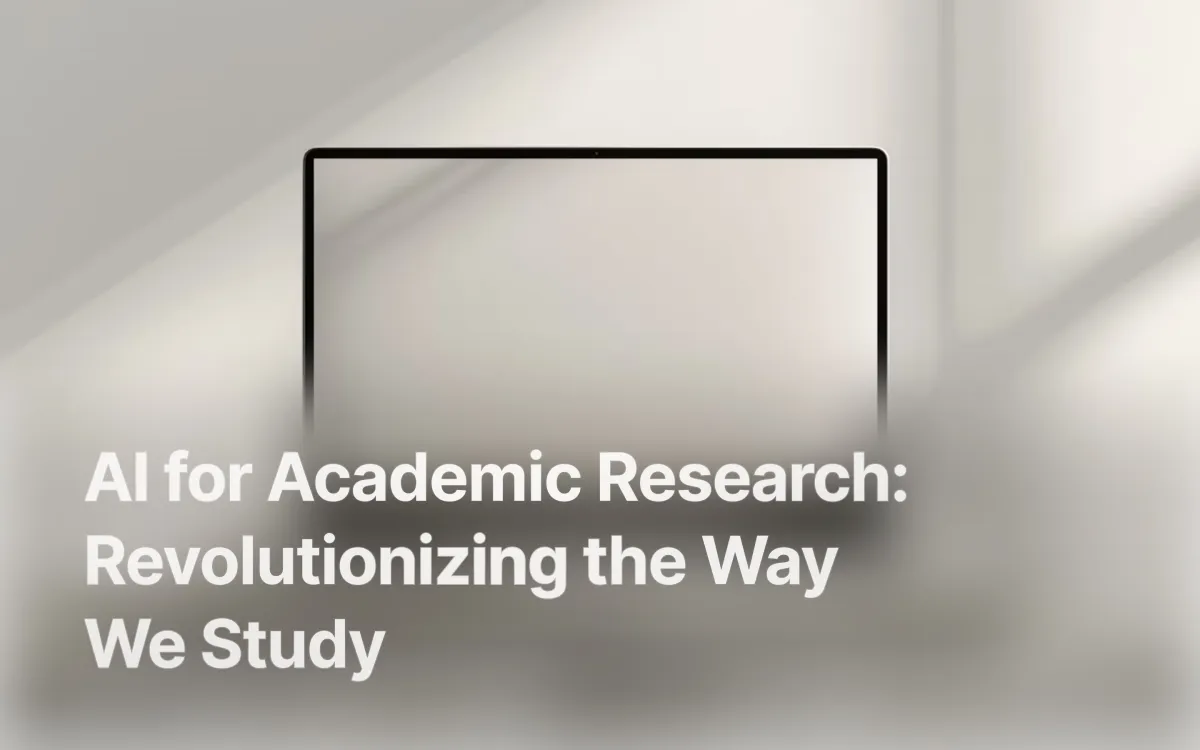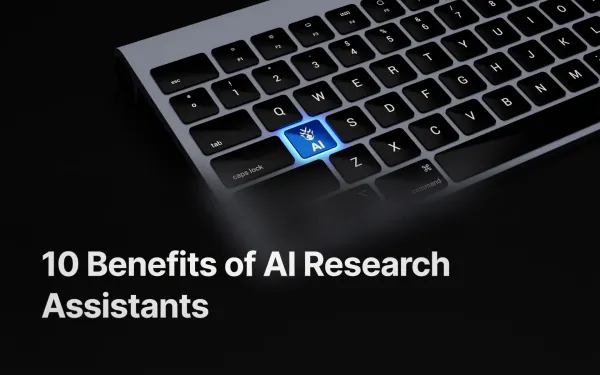AI for Academic Research: Revolutionizing the Way We Study
Discover how AI is transforming academic research, enhancing data analysis, literature reviews, and writing assistance for students and scholars.

Did you know that over 80% of universities are now using some form of artificial intelligence (AI) in their academic research?
This rapid growth shows just how important AI has become in the world of education.
AI is not just a buzzword; it’s a powerful tool that is changing the way researchers work. From helping students find relevant literature faster to analyzing large sets of data in seconds, AI is making academic research more efficient and accessible. With its ability to process information and generate insights quickly, AI is opening new doors for students, professors, and researchers alike.
In this article, we will explore how AI is revolutionizing academic research. We’ll discuss the benefits it brings, the various tools available to assist researchers, the challenges that come with its use, and real-world examples of successful integration.
By the end, you’ll have a clear understanding of how AI is reshaping the landscape of academic research and what it means for the future of learning.
What is AI and Its Importance in Academic Research?

Artificial Intelligence, commonly known as AI, refers to the ability of machines or computer systems to perform tasks that usually require human intelligence. This includes things like understanding language, recognizing patterns, and making decisions. There are different forms of AI that researchers use today:
- Machine Learning (ML): This is a type of AI where computers learn from data. For example, if you feed a machine lots of examples of pictures of cats and dogs, it can learn to identify which is which based on patterns in the data.
- Natural Language Processing (NLP): This form of AI helps computers understand and interact with human language. For instance, when you talk to a virtual assistant like Siri or Google Assistant, they use NLP to understand your words and respond appropriately.
- Computer Vision: This area focuses on enabling machines to interpret and make decisions based on visual data from the world, like recognizing faces in photos or detecting objects in videos.
AI is important in academic research because it helps scholars and students work more efficiently and effectively. By automating tasks that are often time-consuming, such as analyzing large amounts of data or searching through numerous research articles, AI allows researchers to focus on the more creative and critical aspects of their work.
Current Trends in AI Research
In recent years, AI has made significant strides that are particularly relevant to academic research. Here are some of the current trends:
- Data Analysis: Researchers are now using AI tools to analyze complex data sets. For instance, AI can quickly spot trends or anomalies in research data, making it easier to draw meaningful conclusions.
- Automated Literature Reviews: AI algorithms can sift through thousands of research papers to find relevant studies on a specific topic. This saves researchers hours of manual searching and helps them stay up-to-date with the latest findings in their field.
- Collaborative Research: Many universities are utilizing AI platforms that facilitate collaboration among researchers. These platforms can match researchers with similar interests and suggest potential partnerships, leading to more innovative projects.
- Personalized Learning Experiences: AI is also being used to create customized learning experiences for students. By analyzing how students learn and what resources they need, AI can help tailor educational materials to fit individual learning styles.
Overall, these advancements show that AI is becoming an important part of academic research, enhancing how researchers work and interact with information. As technology continues to evolve, the possibilities for AI in education are only expected to grow.
4 Benefits of AI in Academic Research

1. Enhanced Data Analysis
One of the most significant benefits of AI in academic research is its ability to analyze large datasets quickly and accurately. Researchers often work with massive amounts of data, which can be overwhelming and time-consuming to sift through manually. AI tools can help in several ways:
- Speed: AI algorithms can process vast amounts of data in a fraction of the time it would take a human. This means researchers can get results faster and make timely decisions based on their findings.
- Pattern Recognition: AI can identify patterns and trends in data that might be difficult for humans to see. For example, if a researcher is studying the effects of a new drug, AI can analyze patient data to find correlations between dosage and health outcomes.
- Predictive Analysis: Some AI tools can predict future trends based on historical data. This is particularly useful in fields like public health, where researchers can forecast outbreaks or the spread of diseases.
2. Improved Literature Review
Finding relevant literature for research can be a daunting task, often requiring hours of searching through numerous articles and papers. AI can streamline this process significantly:
- Smart Search Algorithms: AI-powered literature review tools can quickly search through thousands of academic articles to find the most relevant studies for a particular topic. These tools often use keywords and topics to match the researcher’s needs.
- Summarization: Some AI tools can summarize research papers, highlighting key findings and methodologies. This helps researchers quickly understand the main points without having to read every article in detail.
- Recommendation Systems: Just like how Netflix recommends movies based on your viewing history, AI can suggest relevant articles based on what researchers have previously read, making it easier to discover new research.
3. Automated Writing Assistance
Writing a research paper can be a challenging task, but AI tools can help simplify the process:
- Grammar and Style Checkers: AI writing assistants, like Grammarly, can review research papers for grammatical errors, spelling mistakes, and issues with writing style. This allows researchers to produce polished documents with less effort.
- Content Generation: Some AI tools can even help generate content. For instance, they can assist in drafting sections of a paper based on outlines or key points provided by the researcher, saving time during the writing process.
- Citation Management: AI tools can also manage citations and references, automatically formatting them according to different academic styles. This ensures that researchers don’t miss important references and helps avoid plagiarism.
4. Personalized Learning
AI is transforming education by offering personalized learning experiences tailored to individual needs:
- Customized Resources: AI systems can analyze a student’s performance and learning style to suggest specific resources that can help improve their understanding of a topic. For example, if a student struggles with statistics, the AI might recommend additional tutorials or articles focused on that area.
- Adaptive Learning Platforms: These platforms adjust the difficulty of tasks based on a student’s progress. If a student excels in a subject, the AI can present more challenging material. Conversely, if they are struggling, it can provide more foundational resources.
- Feedback and Support: AI can offer real-time feedback on assignments or practice exercises, helping students identify areas for improvement immediately. This instant support can boost learning outcomes and keep students motivated.
Overall, AI is revolutionizing academic research by enhancing data analysis, streamlining literature reviews, providing writing assistance, and personalizing learning experiences. These benefits not only make research more efficient but also empower students and researchers to focus on innovation and creativity.
Challenges and Limitations of AI in Academic Research

While AI offers many benefits in academic research, it also comes with challenges and limitations that researchers need to be aware of. Let’s take a closer look at some of these concerns:
1. Data Privacy Concerns
One of the major challenges of using AI in academic research is ensuring the privacy and security of data:
- Handling Sensitive Data: AI tools often require large amounts of data to function properly. In academic research, this data can include sensitive information like personal details, medical records, or proprietary research findings. If this data isn’t handled carefully, there’s a risk of it being misused or falling into the wrong hands.
- Ethical Issues: Researchers need to consider the ethical implications of using AI tools. For example, if an AI system is used to analyze patient data without proper consent, it could violate privacy laws and ethical research standards. It's important to ensure that data collection and usage follow strict ethical guidelines.
- Data Security Risks: Storing large amounts of data on digital platforms can make it vulnerable to cyberattacks. Hackers may target valuable research data, and without proper security measures, it could be compromised.
2. Quality of AI-Generated Content
AI tools are great for helping with tasks like data analysis and writing, but they’re not perfect. There are some issues with the quality of AI-generated content:
- Inaccuracies: AI systems can sometimes produce incorrect or misleading results. For example, if an AI tool is analyzing research data, it might misinterpret certain patterns or make mistakes in calculations. This can lead to flawed conclusions and affect the overall quality of the research.
- Bias in AI Models: AI systems learn from the data they’re trained on. If that data contains biases, the AI can also become biased. For example, if an AI tool is trained on research that favors one perspective or excludes certain groups, it might reinforce those biases in its findings. This can be a big problem, especially in academic research, where objectivity is crucial.
- Limited Creativity: While AI can assist in tasks like writing, it lacks the creativity and critical thinking skills that humans bring to research. AI-generated content might be factual but could miss the depth, nuance, and originality that human researchers contribute to academic work.
3. Dependence on Technology
As AI tools become more popular in academic research, there’s a growing concern about over-reliance on technology:
- Loss of Critical Skills: If researchers start depending too much on AI, they might lose important skills like critical thinking, problem-solving, and hands-on data analysis. For example, relying on AI to write research papers could make researchers less practiced in organizing ideas or crafting arguments.
- Overconfidence in AI: There’s a risk that researchers might trust AI-generated results without questioning them. Just because a tool is powered by AI doesn’t mean it’s always right. It’s important for researchers to review and verify the findings, rather than taking them at face value.
- Technical Issues: AI systems are still machines, and they can fail or produce errors. If researchers rely heavily on AI tools, technical problems like system crashes or bugs can disrupt their research process. In some cases, this could even lead to lost data or delayed projects.
Future Trends of AI for Academic Research

As AI continues to evolve, its role in academic research is expected to grow even more important. Here’s a look at what we can expect in the next decade and how universities might adapt to these advancements.
1. Predictions for the Next Decade: What Advancements Can We Expect?
AI technology is advancing rapidly, and in the coming years, we can expect to see several exciting developments in the field of academic research:
- Smarter AI Tools: AI tools will become even more intelligent and capable of handling more complex tasks. For example, we might see AI systems that can understand deeper meanings in research papers, summarize complex ideas more accurately, or even generate original research proposals based on previous work.
- AI-Assisted Discoveries: In fields like science and medicine, AI could play a major role in making new discoveries. AI systems could analyze massive datasets that humans can’t easily process and find hidden patterns, leading to breakthroughs in areas like disease research, climate change, or engineering.
- Improved Collaboration: AI might help researchers from different parts of the world collaborate more easily. AI platforms could match researchers with similar interests and automatically connect them to work together on global research projects. This could lead to more diverse, innovative ideas coming to light.
- Voice and Image Recognition: As AI’s abilities in natural language processing and computer vision improve, researchers may be able to analyze spoken language or images with more precision. For instance, historians could use AI to analyze ancient texts or images, while medical researchers could use AI to examine medical images for early signs of diseases.
- AI for Data Prediction: AI will get better at not just analyzing past data but also predicting future trends in various fields of research. For example, in economics or social sciences, AI might help predict how populations will respond to certain policies or changes.
2. Potential Impact on Academic Institutions: How Universities Might Change Their Approach to Research
As AI becomes more integrated into academic research, universities and academic institutions will need to adapt in several ways:
- Changing Curriculum: Universities will likely start offering more courses on AI and data science, even in fields that traditionally didn’t focus on technology, like the humanities or social sciences. Students will need to learn how to use AI tools effectively, as these skills will become essential in academic research across disciplines.
- AI Research Centers: More universities may establish dedicated AI research centers or labs. These centers would focus on developing new AI technologies, training students and researchers to use AI in their fields, and fostering innovation in academic research. This could also lead to more interdisciplinary research, where experts from different fields work together using AI.
- New Ethical Standards: As AI becomes more prevalent in research, academic institutions will need to update their ethical guidelines. They’ll need to ensure that AI is used responsibly, especially when it comes to data privacy, bias, and the impact on society. Universities might create new policies to address these issues, and researchers will need to be trained on how to use AI ethically.
- Research Efficiency: Universities may become more efficient in how they conduct and publish research. With AI’s ability to automate tasks like data analysis, literature review, and writing, researchers will be able to complete their projects more quickly. This could lead to a faster pace of scientific discovery and a greater volume of research being published.
- Increased Collaboration with AI Companies: As AI tools become more specialized and advanced, universities may partner more closely with tech companies that develop AI technologies. This collaboration could result in more access to cutting-edge AI tools, giving researchers the resources they need to push the boundaries of academic discovery.
Conclusion
In conclusion, the future of AI in academic research looks incredibly promising. In the next decade, we can expect smarter AI tools, more collaborative research environments, and groundbreaking discoveries in various fields. Academic institutions will need to embrace these changes, adapting their curriculums, research practices, and ethical guidelines to stay at the forefront of innovation.
Frequently Asked Questions
1. Can AI do academic research?
AI can assist in academic research, but it doesn’t replace human researchers. It can help with tasks like analyzing data, reviewing literature, and even assisting with writing, making the research process faster and more efficient. However, human creativity and critical thinking are still needed to interpret results and draw meaningful conclusions.
2. Which is the best AI tool for academic research?
There isn’t one “best” AI tool for academic research as it depends on what you need. Tools like Zotero and EndNote are great for managing citations and references, while Grammarly helps with writing. IBM Watson and Google Cloud AI are used for more advanced data analysis and machine learning tasks.
3. Is it okay to use AI for a research paper?
Yes, it’s okay to use AI tools to assist with your research paper, but you should use them ethically. AI can help with tasks like checking grammar, analyzing data, and finding relevant literature, but you still need to ensure the ideas and content are your own. Always give proper credit and follow your institution’s guidelines.
4. How can artificial intelligence be used in research?
AI can be used in research in many ways, such as:
- Analyzing large amounts of data quickly.
- Helping find and summarize relevant literature.
- Assisting with writing by suggesting grammar corrections and improving clarity.
- Predicting future trends based on past research data.
- Facilitating collaboration by connecting researchers with similar interests.



